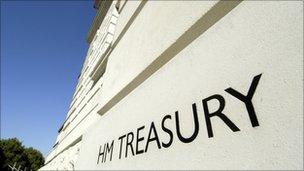UK public sector borrowing hits record high of £14.4bn
- Published

A weak economy continues to weigh on public finances
UK public sector net borrowing was £14.4bn in August, the Office for National Statistics has said, external, the biggest deficit for the month since records began.
The figure was marginally higher than for the same month last year.
Corporation tax receipts fell by 2.1% and benefits payments rose 4.9%.
The figures make it more likely that the government will fail to achieve its aim of wiping out the structural budget deficit by 2015.
The borrowing figures differ depending on whether the temporary effects of one-off financial transactions are included or excluded.
The April 2012 net borrowing figures included two one-off transactions to the government - £28bn from the transfer of the Royal Mail Pension Plan and £2.3bn following the closure of the Special Liquidity Scheme.
The ONS says that for the period April to August 2012, public sector net borrowing, excluding financial interventions such as bail-outs to the banks, was £31bn, £17.4bn lower than in the same period last year.
But if the effect of this Royal Mail and other transactions are stripped out, then public sector net borrowing for April to August 2012 actually increased 22% to £61.3bn, £12.9bn higher than in the same period last year.
Balancing the books
The ONS also reported that public sector net borrowing for the fiscal year 2011/2012 was £119.3bn, £6.7bn lower than the Office for Budget Responsibility (OBR) forecast of £126bn.
David Gauke, Exchequer Secretary to the Treasury, said: "Today's figures show the government borrowed almost £7bn less last year than previously estimated.
"This is further evidence that we are dealing with our debts and getting the deficit down."
But Labour Treasury spokesman Chris Leslie said: "These figures show that the deficit is rising because the government's economic plan is failing.
"We have the highest ever borrowing for any August and borrowing is up by 22% so far this year compared to the same period last year."
Chancellor George Osborne's aim to balance the government's books by 2015 is "in tatters", he added.
David Kern, chief economist at the British Chambers of Commerce (BCC), said: "Unless present trends are reversed in the next few months, we now expect total borrowing in 2012/13 as a whole to exceed the total predicted by the OBR at the time of the Budget by more than £20bn."
He said the situation was "worrying".
'Persistently weak'
With public sector net debt standing at £1.04 trillion at the end of August 2012, equivalent to 66.1% of gross domestic product (GDP), the pressure on the Chancellor George Osborne remains intense.
But on Thursday night, the chancellor received some support from Sir Mervyn King, governor of the Bank of England.
In an interview with Channel 4 News, Sir Mervyn said it would be "acceptable" if the government missed its deficit reduction target, as long as this was the result of slower global economic growth.
However, the BCC's Mr Kern warned that "if persistently weak growth causes borrowing to overshoot, the UK's credit rating may be endangered".
He argued that public spending cuts should be supplemented with policies to boost growth, including infrastructure spending, support for business lending, and a reduction in National Insurance Contributions.
- Published20 September 2012
- Published30 August 2012